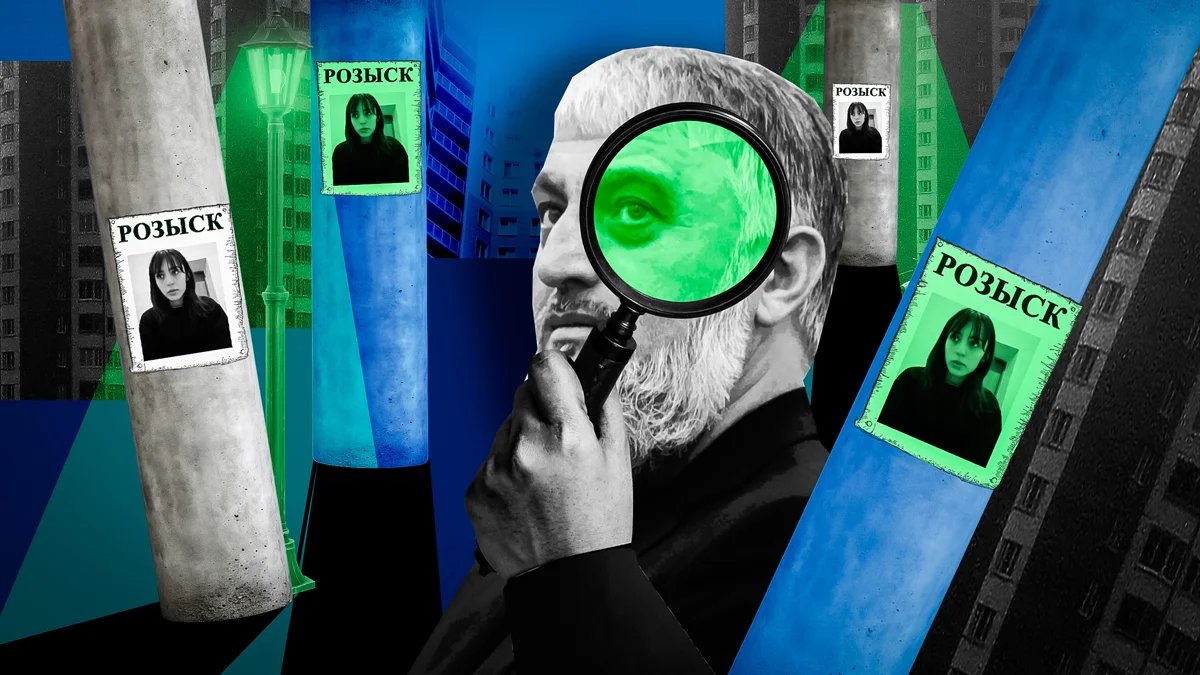“They want to take Liya to Chechnya, and we know that girls who are taken to Chechnya usually don’t come back,” human rights organisation Marem wrote in an ominous Telegram post on 16 May as 19-year-old Liya Zaurbekova was holed up in a Moscow police station.
Three days earlier, she had run away from her family, fearing for her life. A group of her relatives came to the police station, demanding the police hand her over. Somehow, despite promises by the Chechen authorities to take “personal control” of her fate, Zaurbekova eventually managed to flee the country.
Home prison
The eldest of four children, Liya Zaurbekova spent her childhood with her mother in Chechnya while her father worked in Moscow. But when she was 15, the family all moved to Krasnogorsk, near Moscow, where her father, Beslan, was working.
“My dad went into religious fanatic mode when it suited him. He told me to pray, not to wear skirts that didn’t cover my knees, not to wear trousers, to wear a hijab,” she recalls.
Liya only discovered what kind of man Beslan was when she saw him in close quarters every day. He demanded she be the “perfect Chechen girl” and forced her to stop attending college.
“My dad went into religious fanatic mode when it suited him. He told me to pray, not to wear skirts that didn’t cover my knees, not to wear trousers, to wear a hijab,” she recalls.
Worried that his daughter would make friends with people from different ethnic backgrounds, Zaurbekov would encourage Liya’s mother to beat her and demand she hand over her phone contact list.
After two years spent essentially stuck inside, Liya said she began to go crazy. She begged her grandmother in Chechnya to persuade her father into letting her complete high school. He eventually relented and arranged for his daughter to study to be a pharmacist in Moscow.
Although Liya was now 17, her mother chaperoned her from Krasnogorsk to Moscow almost every day. She also selected the Muslim women in hijabs she said her daughter could befriend, believing that through them she would be able to keep tabs on her daughter.
While studying at college, Liya got a job working at an exhibition. At first, her parents didn’t stop her, gratified that Liya would finally be earning her keep, but within months they had forbidden it, saying it was bad for her studies.
However, during that short gasp of freedom, Liya had met Artyom, who would go on to play an important role in her escape.
Artyom comes from a large Russian city. His mother is Kazakh, and he doesn’t know his father. When Artyom was about six, his mother married another man, gave birth to another son, and four years later left the family.
Artyom was initially raised by his stepfather, who sometimes beat him — Artyom says “basically, that was normal, seeing as I’m not his own son” — but a few years later he was placed in an orphanage.
Artyom went to college, studied programming, saved up and moved to Moscow. He didn’t know anyone in the capital, so he made a concerted effort to find friends online, which is how he met Liya in December.
Liya’s family knew nothing about him.
The escape
Liya ran away from home on 13 May, the first day back at college after the spring break. There was more trouble at home, and the level of control over her life was on the increase. That morning, Liya packed some essentials, plus her ID and a passport, which she had organised in secret by skipping college a few months before her escape. She left home to go to college as normal.
Once there, she applied to defer her studies, and then went to the police station and wrote a statement that she had left home of her own free will. She removed the SIM card from her phone and went to stay with Artyom.

Illustration: Novaya Gazeta Europe
The police tried to persuade Liya to return to her family. “This is tradition. Why did you run away if you knew this would happen?” they asked.
She had been there for three days when she saw her father in the courtyard of the building on 16 May. She says she started to panic at that point, as she realised that if he had found her, the police must be helping him. She and Artyom called the police anyway, who took them to the station, where some Chechen men were already waiting for her. One Chechen man threatened Artyom in front of the police officers.
“Some Chechen guy I didn’t know grabbed me, saying he knew I was in some terrorist organisation and was trying to recruit Liya,” Artyom says.
The police tried to persuade Liya to return to her family. “This is tradition. Why did you run away if you knew this would happen?” they asked.
From the police station Liya was able to write to Marem, which works to protect the human rights of vulnerable people in the North Caucasus. The organisation promptly published its post, in which it asked people to contact the police to demand Liya’s safety.
Marem also published a video Liya had made in which she stressed that she had left home of her own free will but was afraid to leave the police station. “If they are behaving like this in front of the police now, I don’t know what they might do to me in private,” she said.
Russian nationalists to the rescue
Journalists converged on the police station after Marem published its call to action. One of the unidentified Chechen men there told a journalist that they “wanted to resolve things normally,” while Liya’s father said that “representatives from Chechnya” would soon be there.
At that point, Liya and the human rights activists decided not to reveal that Artyom was with her. The reason was simple. Liya could have been handed over to her family at any moment, and the news that she was with her boyfriend would only have made a bad situation worse. Liya’s father, however, did speak to journalists about what he called her “beloved”.

Illustration: Novaya Gazeta Europe
Once the press started covering the case of Liya and her boyfriend, Russian nationalists piled in too. They drew parallels between Liya and another Chechen runaway, Seda Suleymanova, who was abducted last year by the Chechen security forces from the apartment she shared with her ethnic-Russian boyfriend in St. Petersburg. In February, the North Caucasus SOS crisis group devoted to helping LGBTQ+ people in the region said that she might have been killed by her own family.
“Medieval barbarism in the centre of Moscow … But interesting, what if, ‘in keeping with tradition’, she is killed by her relatives if the police hand her back. It’s not impossible. Will nobody react?” well-known nationalist blogger Yury Podolyaka asked indignantly.
Every right-wing or pro-war blogger who wrote about the case attempted to justify their anti-Chechen rhetoric by alleging that Zaurbekova’s relatives wanted to kill her for “dating a Russian”. Until a Russian man was involved, none had previously written about such cases.
Deliverance
The activists, press and Russian nationalists who wrote about the case accused Russian law enforcement of pandering to Zaurbekova’s relatives.
The police ultimately decided to help, and while some staff distracted the men gathered in the police station courtyard, others let Liya and Artyom out through an emergency exit. From there, they went straight to the airport.
“I absolutely do not regret running away,” Liya told Novaya Europe. “I miss my younger brother, and sometimes I get frightened, but on the whole I think I did the right thing.”

Illustration: Novaya Gazeta Europe
It was at this point of proceedings that Chechnya’s State Duma Deputy Adam Delimkhanov joined the fray, announcing he had taken “personal control” of the case and, on Chechen head Ramzan Kadyrov’s instructions, would see that Zaurbekova was returned to her relatives. Delimkhanov added that Zaurbekova was misled by a certain person who would face the full force of the law, without specifying who.
“It’s frightening that Delimkhanov has referred to my case. I’m really scared they’ll come looking for me and force me to go back if they find me,” Liya said in a second video message she recorded once she had left Russia, adding that she just wanted “to be left alone”.
Liya and Artyom now live outside Russia, though their whereabouts remain undisclosed for their safety.
“I absolutely do not regret running away,” Liya told Novaya Europe. “I miss my younger brother, and sometimes I get frightened, but on the whole I think I did the right thing.”
Artyom says he feels very similarly, though he admits to wondering a few times just what he had got himself into. He said he had never heard of similar cases and admitted being astonished by how things played out when Liya fled.
“I stayed true to my ideals. Of course that involves fear and risk,” Artyom said, adding: “I have plans, I want to find a job. I need to get my refugee status sorted out and go to language classes. Liya really wants to go to university. Life is just beginning.”
Meanwhile, Liya’s father continues to search for his fugitive daughter. “Nobody has given up on Liya. We did everything we could to stop her leaving, but she managed to escape. She went away, like I’m her enemy, and now she’s hiding from me,” said Beslan.
He added that the accusations of physical abuse Liya made had been invented and that she had been unable to provide any evidence to back them up.
“We have our own laws. Disobey those and there’ll be trouble, but you’d have to be crazy to do that,” he added.
The article was written in cooperation with Svoboda (ne) za Gorami podcast, which specialises in the North Caucasus.
Join us in rebuilding Novaya Gazeta Europe
The Russian government has banned independent media. We were forced to leave our country in order to keep doing our job, telling our readers about what is going on Russia, Ukraine and Europe.
We will continue fighting against warfare and dictatorship. We believe that freedom of speech is the most efficient antidote against tyranny. Support us financially to help us fight for peace and freedom.
By clicking the Support button, you agree to the processing of your personal data.
To cancel a regular donation, please write to [email protected]

